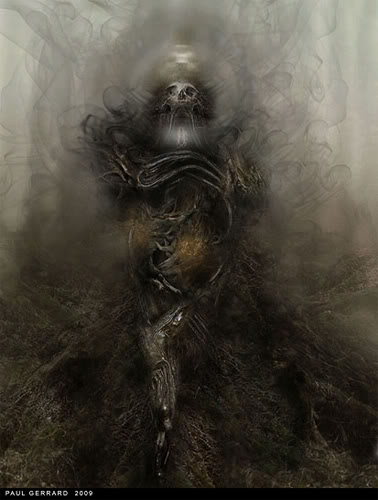 credit: Paul Gerrard
credit: Paul Gerrard
A man wandered in a dream along his way, not knowing he was dreaming. He came to a high, barren, brazen mountain, that barred his way and shone so brightly that he could see his reflection. He reflected in the black reflection and spoke shakily: “This is a mirror, I see nothing; I see myself — nothing.” And a voice called; “Have you left the world behind you?” “Yes”, whispered the man, “It is done.” “So, look into me; behind your reflection you will see the world.” The man starred into the dark light and spoke slowly: “I see the world, I see nothing.” He felt a gloomy sense about himself and the world. There came black serpents from the mountain and they covered the man from head to toe with a terrible force. They jangled in his ear: Because you still sense — because you still think — because you still answer. The man now took to the air – higher and faster – and the chains followed endlessly behind him, and finally the black mountains in chains dissolved behind him and the man shouted happily: “I am flying — I am dreaming.” He realized now, that he dreamt and flew in chains as far as he could.
* * * * *
The man, the language critic as founded by Fritz Mauthner, is tied and liberated and knows he dreams when he tries to picture the world. And does not everyone who has ever tried to tell their dreams in words discovered that the very best effort dissolves and melts away as the try to hold it in their hands?[1]
But yet! What would the greatest deed be worth that killed the absolute and destroyed every truth — if this nihilism and irony were not the path to the way of life, to merriment and unbelieved illusion? Illusion — of an idea believed, a sacred goal — that was the spell placed on people of all cultures — don’t we all want to be dreamers? Flyers? Artists? Free?
Well then: All of you who strive for the knowledge of your being and the world, their theorists, who want to bury or build into the world, their artists, who build their dreams, let aside everything else for awhile and read this book, the criticism of linguistics, I have the hope — for as man is not killed by anything that comes from man, out of every great despair in the end new, greater hope arises — that their theoreticians, together with the artists, will then really dream and fantasize; that the master builders will break down and set up an atonement with unprecedented depth and valor, because where nothing is certain and its reason is more, we are about to drive our stakes. That seems to me the nature of the new people. Kant’s Critique of Pure Reason stands for me causally related not only to Romanticism but also to the revolutionary transformations of 1830 and 1848; so, for me, the great value of skepticism and the most radical negation that Mauthner[2] has committed is the pioneer of new mysticism and new powerful action.
[1] Goethe wrote:
könnt ihr den weiten raum
des himmels und der erde
mir ballen in meine faust?
Can you bale in my fist
the wide space
of sky and earth?
[2] Fritz Mauthner (1849-1923) was an Austro-Hungarian novelist and an exponent of philosophical skepticism which was derived from a critique of human knowledge and the philosophy of language. Mauthner believed that knowledge is impossible and that mathematics and science are hypothetical at best. For him there can be no a priori knowledge. This meant that since there was nothing to build on, no real knowledge could be captured. His most focused criticism is on language. Since all we have are words, these are imperfect tools to capture true knowledge. According to Mauthner, our beliefs then are built on imperfect words and this was dangerous because it could lead to tyranny. He believed that what we perceive through our senses is contingent on “usefulness”. Therefore, it does not follow that our senses are accurate. Also, crude language is unable to capture nature completely. He traces the use of nouns to metaphysical confusion and the assertions attached to properties that are given to us in the senses. As language changes, other cultures adapt words that move them further from reality. Words like “morality”, “god”, “race” and “state” are trapped in what Mauthner calls “word superstition”.
Skepticism and Mysticism On Mauthner’s Critique of Language by Gustav Landauer 1903 (Lulu Press 2019)

Reblogged this on Discover Something New and commented:
Gustav Landauer’s “Skepticism and Mysticism” has been released on Lulu Press 2019.
LikeLike